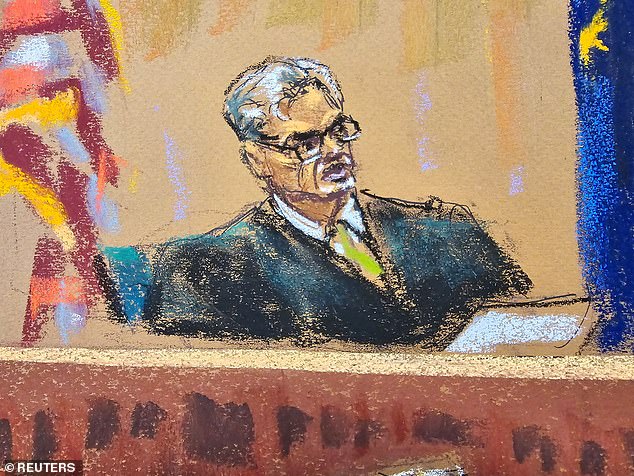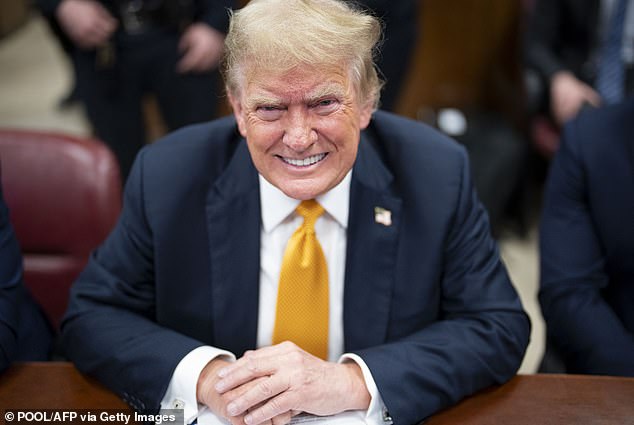What happens now after jury convicts Donald Trump of all 34 counts in hush money case? Here’s what it means
The verdict has been handed down and Donald Trump has become the first former president in US history to ever be convicted of a crime.
A jury in New York has found the ex-president and Republican presidential candidate guilty of all 34 counts of falsifying company records and he will be sentenced on July 11.
Trump’s legal team is expected to appeal, but the unprecedented conviction sets in motion a process that all convicted criminals within Manhattan’s criminal justice system face.
Despite his conviction, he can still run for president and is expected to campaign furiously ahead of his expected rematch with President Joe Biden.
The judge has discretionary power when it comes to sentencing. So will he go to jail, or will he get probation?
Donald Trump spoke to the media on May 30 as jury deliberations were set to resume
The probation office in the Manhattan courthouse would begin preparing the pre-sentencing report for the judge, which will include recommendations.
If Trump thought the “freezing” courtroom was bad, the probation office is even worse.
The New York City Probation Department is located on the 10th floor of the Manhattan Courthouse and is located at the end of a long hallway through a series of double doors.
Depending on how to get there, visitors will have to walk past the sex offender registration office.
Inside is the drab reception area with gray plastic chairs, light brown walls, lime green colored trim and stained tiled floors. Visitors wait to be called into the surrounding offices.
This process includes interviewing the former president for details about his history, mental health and circumstances surrounding the conviction.

A sketch of Judge Juan Merchan during the hush money trial. Conviction of Donald Trump is discretionary

Trump returned to the courtroom after a break as the jury began deliberations on May 29
“Trump is getting a bird’s-eye view of the criminal justice system from a very different perspective than he’s ever had,” said Cheryl Bader, an associate professor of law at Fordham.
The prosecution and Trump’s defense team also have the opportunity to present additional information to the judge for sentencing and probation.
“Presentation reports are required if the suspect faces jail time,” said David Shapiro, a former assistant prosecutor and lecturer at the John Jay College of Criminal Justice. “These reports must be completed before sentencing within a reasonable period of time, which in most cases should not exceed one year.”
First-degree falsification of business documents carries a maximum penalty of four years in prison.
Theoretically, Trump could face a prison sentence of 136 years if he receives consecutive sentences on all charges.
But even before the verdict came down, legal experts suggested it was unlikely Trump would end up behind bars.
Trump, 77 years old, has no prior convictions. The charges also include a non-violent crime.
New York law does not recommend prison time for non-violent crimes where the suspect has no prior felony conviction within the last 10 years.
The most likely option, according to legal experts, is that the ex-president risks probation or a large fine. Both pose their own challenges for the former president.

The charge of falsifying a business document in the first degree carries a maximum penalty of four years in prison
Probation requirements depend on the case, but it could pose logistical challenges for Trump if he needs to be cleared to travel and face reporting requirements as he ramps up his presidential campaign in battleground states.
Although the probation could mean that Trump can travel on a limited basis, there is also the possibility that he could report to a probation officer by telephone.
“The probation officer also has the ability to somewhat reduce the amount of supervision required if the person is compliant,” Bader said.
Fines could also hinder the ex-president in another way, as he already faces staggering penalties for committing civil fraud in New York and for defaming E. Jean Carroll.

Donald Trump at his rally in Wildwood, NJ on May 11, while on a weekend away from the hush money trail
Meanwhile, Trump, as a former president and presumptive Republican presidential nominee, has another unique consideration that officials must deal with.
Trump enjoys Secret Service protection. The agency has reportedly already been in discussions about how it would proceed with protecting him if Trump were actually incarcerated.
Trump’s lawyers have already been able to delay the three other cases against him.
Although New York law made it difficult to delay the hush money case, his team is expected to appeal the conviction.
“After the conviction, the case is ripe for appeal,” Bader said. An appeal would go to the First Department of the Appellate Division.
Although the case would make its way into the New York criminal justice system, it appears the verdict will have little impact on voters.
A new NPR/PBS NewsHour/Marist Poll of registered voters found that 67 percent said it would make no difference to their vote if Trump were found guilty in the hush money case.
15 percent said a guilty verdict would make them more likely to vote for him, while 17 percent said they would be less likely to vote for him in November.
Among independent and Republican voters, a guilty verdict was more likely than less likely to make them vote for Trump.
